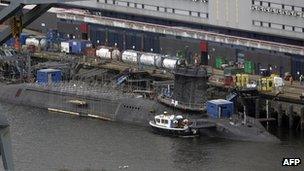Scottish independence: What happens to UK defence?
- Published

The UK's nuclear arsenal is housed at the Faslane base on the River Clyde
The timing and arrangements for a referendum on Scottish independence are yet to be settled. But the debate about what it would mean for Scotland and the rest of the UK is well under way.
The number of troops and Ministry of Defence staff based in Scotland is due to rise to 20,000 over the next eight years, with many of the soldiers returning from the British base in Germany due to move north of the border.
But the Scottish National Party says an independent government in Edinburgh would want its own Scottish Defence Force.
The SNP's Westminster leader and defence spokesman, Angus Robertson, said an independent government would start by taking the Royal Regiment of Scotland, the Royal Scots Dragoon Guards and the Scots Guards, and then begin discussions about other capabilities.
"Normal countries decide whether they send their young men and women to war or not. Scottish recruited units will come under the aegis of Scottish Defence Forces," he said.
But that idea was flatly rejected by Defence Secretary Philip Hammond, who said: "The UK armed forces are a highly integrated and very sophisticated fighting force.
"The idea that you could break off a little bit like a square on a chocolate bar - and that would be the bit that went north of the border - is frankly laughable."
Nuclear question
Faslane, on the River Clyde, was chosen as the home of the UK's nuclear submarines in 1963. While the MoD says it provides 6,500 jobs and supports 3,500 more in the local economy, it has always been controversial.
Anti-nuclear protests have taken place there ever since and the SNP says a majority of Scotland's MPs and MSPs oppose the nuclear facilities there.
If Scotland were to become independent, the party proposes turning it into a headquarters for Scotland's conventional naval force.
Admiral Lord West, the former head of the Royal Navy, said it would be extremely difficult to move the nuclear warheads and the explosives handling jetty at nearby Coulport.
"It's the largest floating structure in Europe - a huge concrete shed that floats," he said. "Moving that would be a huge, huge, complex operation."
Finding an alternative, secure deep-water site with access to the Atlantic at which to locate the UK nuclear arsenal would not be easy and could provoke a whole new controversy.
Philip Hammond said moving such a highly-specialised facility could take a decade.
"Obviously the cost of doing that would have to be taken into account in any sort of reckoning-up on Scottish independence if that is the way it goes," he said.
But asked if the SNP was prepared to pay if it formed a government in Edinburgh, Angus Robertson replied: "Why should we?
'Co-operation'
"If London really cared so much about nuclear weapons systems perhaps they would have considered the public opinion of people in Scotland decades ago.
"They might find it difficult to find locations in England, but perhaps they should have thought about that before foisting it on people in Scotland who never wanted it in the first place."
The Ministry of Defence is working out the details of a huge rebasing exercise involving the return of thousands of troops from Germany, cuts to all three services and the establishment of five new multi-role brigades - one of which would be in Scotland under current plans.
The SNP has said an independent Scotland would happily co-operate with the rest of the UK, with members of each others' armed forces sharing bases and training facilities.
And the former head of the Army, General Sir Mike Jackson, said Scottish soldiers who wanted to remain in the UK forces could do so, like many other Commonwealth troops.
But he warned: "There are some very complex issues here, not only in terms of military capability, but issues which affect individual soldiers, sailors and airmen."
- Published19 January 2012